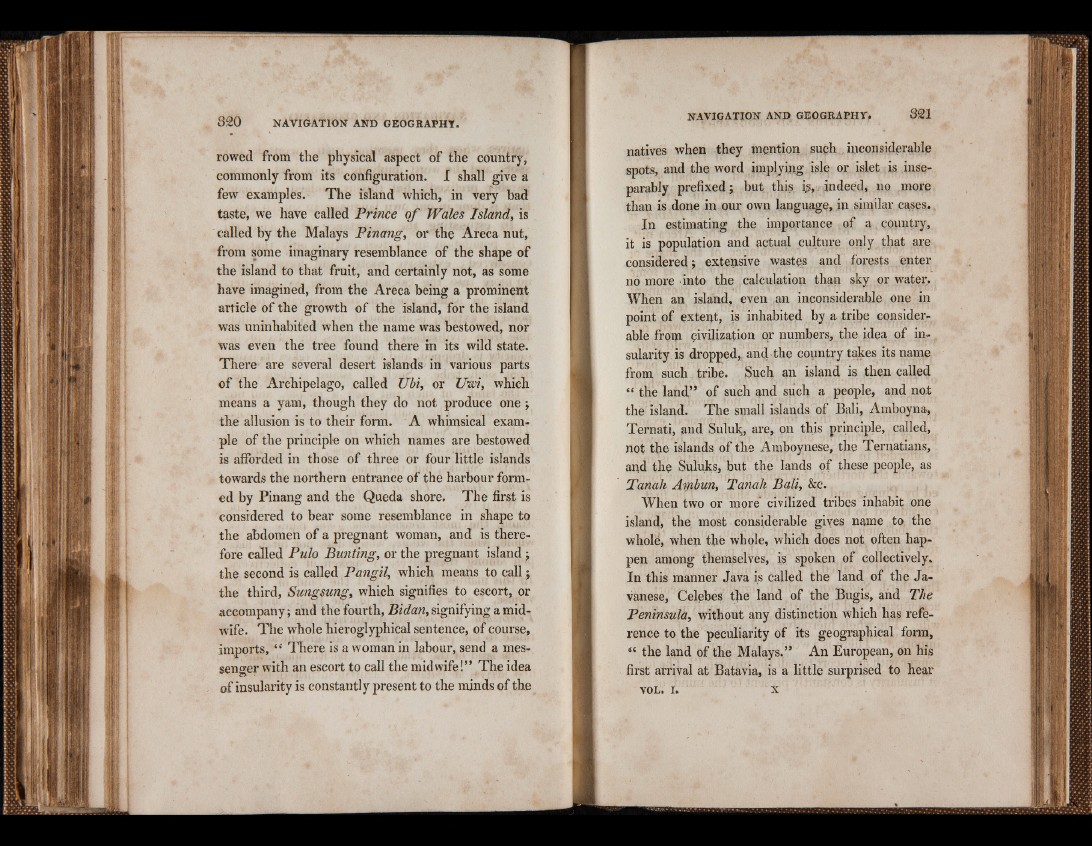
rowed from the physical aspect of the country,
commonly from its configuration. X shall give a
few examples. The island which, in very bad
taste, we have called Prince o f Wales Island, is
called by the Malays Pinang, or the Areca nut,
from some imaginary resemblance of the shape of
the island to that fruit, and certainly not, as some
have imagined, from the Areca being a prominent
article of the growth of the island, for the island
was uninhabited when the name was bestowed, nor
was even the tree found there in its wild state.
There are several desert islands in various parts
of the Archipelago, called TJbi, or Uwi, which
means a yam, though they do not produce one ;
the allusion is to their form. A whimsical example
of the principle on which names are bestowed
is afforded in those of three or four little islands
towards the northern entrance of the harbour formed
by Pinang and the Queda shore. The first is
considered to bear some resemblance in shape to
the abdomen of a pregnant woman, and is therefore
called Pulo Bunting, or the pregnant island;
the second is called Pangil, which means to call;
the third, Sungsung, which signifies to escort, or
accompany; and the fourth, Bidan, signifying a midwife.
The whole hieroglyphical sentence, of course,
imports, “ There is a woman in labour, send a messenger
with an escort to c r> all the midwife!” The idea
of insularity is constantly present to the minds of the
natives when they mention such , inconsiderable
spots, and the word implying isle or islet is inseparably
prefixed; but this, is, indeed, no more
than is done in our own language, in similar cases.,
In estimating the importance of a country,
it is population and actual culture only that are
considered; extensive wastes and forests enter
no more into the calculation than sky or water.
When an island, eyen an inconsiderable one in
point of extent, is inhabited by a tribe considerable
from civilization qr numbers, the idea of insularity
is dropped, and the country takes its name
from such tribe. Such an island is then called
“ the land” of such and such a people, and not;
the island. The small islands of Bali, Amboyna,
Ternati, and Suluk, are, on this principle, called,
not the islands, of the Amboynese, the Ternatians,
aqd the Suluks, but the lands of these people, as
Tanah Ambun, Tanah Bali, &c.
When two or more civilized tribes inhabit one
island, the most considerable giyes name to the
whole, when the whole, which does not often happen
among themselves, is, spoken of collectively.
In this manner Java is called the land of the Javanese,
Celebes the land of the Bugis, and The
Peninsula, without any distinction which has reference
to the peculiarity of its geographical form,
“ the land of the Malays.” An European, on his
first arrival at Batavia, is a little surprised to hear